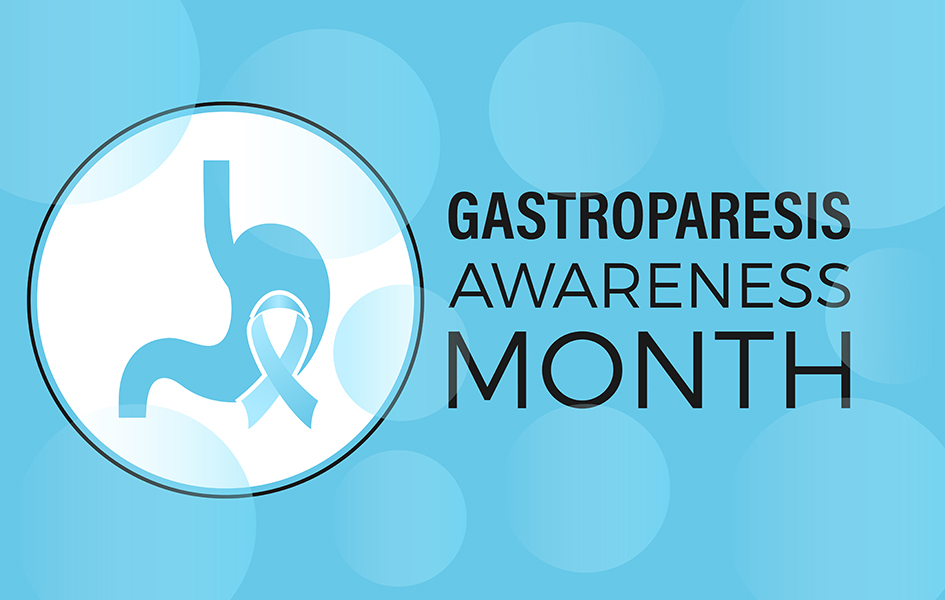August 2024 marks Gastroparesis Awareness Month, a time to shed light on this often-overlooked disease that significantly impacts the quality of life for those affected. In this blog, we’ll explore the symptoms, stages, and treatment options for gastroparesis and discuss why healthcare professionals (HCPs) play a vital role in advancing research and improving patient outcomes.
Understanding Gastroparesis
Gastroparesis, also known as gastric paralysis, is a medical condition where the stomach muscles fail to function properly, preventing food from moving efficiently into the small intestine. Affecting about 1.5% to 2% of the U.S. population, this condition is more commonly diagnosed in women than in men. The disease can be debilitating, leading to severe discomfort and nutritional challenges for those who suffer from it.
Symptoms of Gastroparesis
The symptoms of gastroparesis can range from mild to severe and include abdominal bloating, nausea, vomiting, and a feeling of fullness after eating small amounts. These symptoms not only disrupt daily life but also lead to complications such as malnutrition, weight loss, and fluctuating blood sugar levels. The variability and non-specificity of these symptoms often result in delayed diagnosis, further complicating treatment.
Understanding the root causes of gastroparesis is another area where research is desperately needed. While damage to the vagus nerve—a nerve that controls stomach muscles—is a known cause, the exact mechanisms behind this damage remain unclear. Diseases like diabetes, along with certain surgeries, have been linked to gastroparesis, but there is still much to learn about other potential triggers.
Stages of Gastroparesis
Gastroparesis can be classified into three stages based on the severity of symptoms and the impact on the patient's quality of life. Recognizing these stages helps HCPs tailor their treatment approach.
- Mild Gastroparesis: At this stage, the stomach empties slowly, but the symptoms are relatively mild. Patients may experience occasional discomfort, but it does not significantly impact their daily lives.
- Moderate Gastroparesis: As the condition progresses, stomach emptying becomes more delayed, and symptoms become more prominent. Patients may struggle with regular meals and experience increasing discomfort and nutritional challenges.
- Severe Gastroparesis: In severe cases, the stomach's ability to empty is significantly impaired. Patients may suffer from persistent nausea, vomiting, severe weight loss, and malnutrition. The impact on their quality of life is substantial, requiring more intensive medical intervention.
Treatment Options for Gastroparesis
The treatment of gastroparesis requires a multi-faceted approach, often involving dietary changes, medications, and sometimes surgical interventions. Here’s a closer look at the treatment options available:
- Dietary Modifications: The first line of treatment typically involves dietary changes. Patients are advised to eat small, frequent meals that are low in fat and fiber to ease digestion. Liquids and pureed foods are often recommended, as they are easier to digest.
- Natural Remedies and Lifestyle Changes: Some patients find relief through natural therapies such as consuming ginger for nausea, taking probiotics, and practicing relaxation techniques like acupuncture. Regular physical activity, such as walking after meals, can also help stimulate digestion.
- Advanced Treatments: In severe cases, more invasive treatments may be necessary, such as:
- Jejunostomy Tube: A feeding tube is inserted directly into the small intestine, bypassing the stomach, to provide nutrition.
- Gastric Electrical Stimulation (GES): A device implanted in the stomach sends electrical pulses to stimulate contractions, helping with stomach emptying.
- Parenteral Nutrition: When other treatments fail, intravenous nutrition may be required to ensure the patient receives essential nutrients.
The Vital Role of HCPs in Gastroparesis Research
As HCPs, you have a unique opportunity to make a significant impact on the future of gastroparesis treatment through participation in medical research. By contributing to ongoing studies and completing medical surveys, you can provide valuable insights that help shape new treatment protocols, improve patient outcomes, and advance our understanding of this challenging condition.
At My Medical Panel, we facilitate research studies that focus on diseases like gastroparesis, enabling HCPs to participate in meaningful research that directly benefits patients. By joining our panel, you not only have the chance to earn honoraria but also to steer the direction of healthcare research, making a lasting difference in the lives of patients.
Why Your Participation Matters
Your expertise as an HCP is crucial in driving medical research forward. By participating in surveys and sharing your clinical experiences, you contribute to a body of knowledge that can lead to breakthroughs in treatment and care. This collaboration between HCPs and research organizations is essential for developing innovative therapies and improving the quality of life for patients with gastroparesis and other conditions.
Conclusion
Gastroparesis is a complex condition that requires a comprehensive understanding and a collaborative effort to improve treatment outcomes. As we observe Gastroparesis Awareness Month, we invite you to join My Medical Panel and take an active role in advancing research. Together, we can make a significant impact on the future of healthcare, ensuring that patients receive the best possible care.
Join My Medical Panel today and be part of a community of over 21.6K gastroenterologists worldwide, engaging in 130+ ongoing research studies. Your participation is not just an opportunity to earn—it’s a chance to contribute to groundbreaking research that shapes the future of healthcare.
Are you a physician or healthcare practitioner?
My Medical Panel (MMP) is the home of paid online medical surveys, where healthcare professionals can attend surveys and get compensated for their time spent completing healthcare surveys in their specialty with generous honoraria of up to $1000 for each survey.
Sign up now to My Medical Panel to experience the epitome of convenient paid online medical survey participation.











